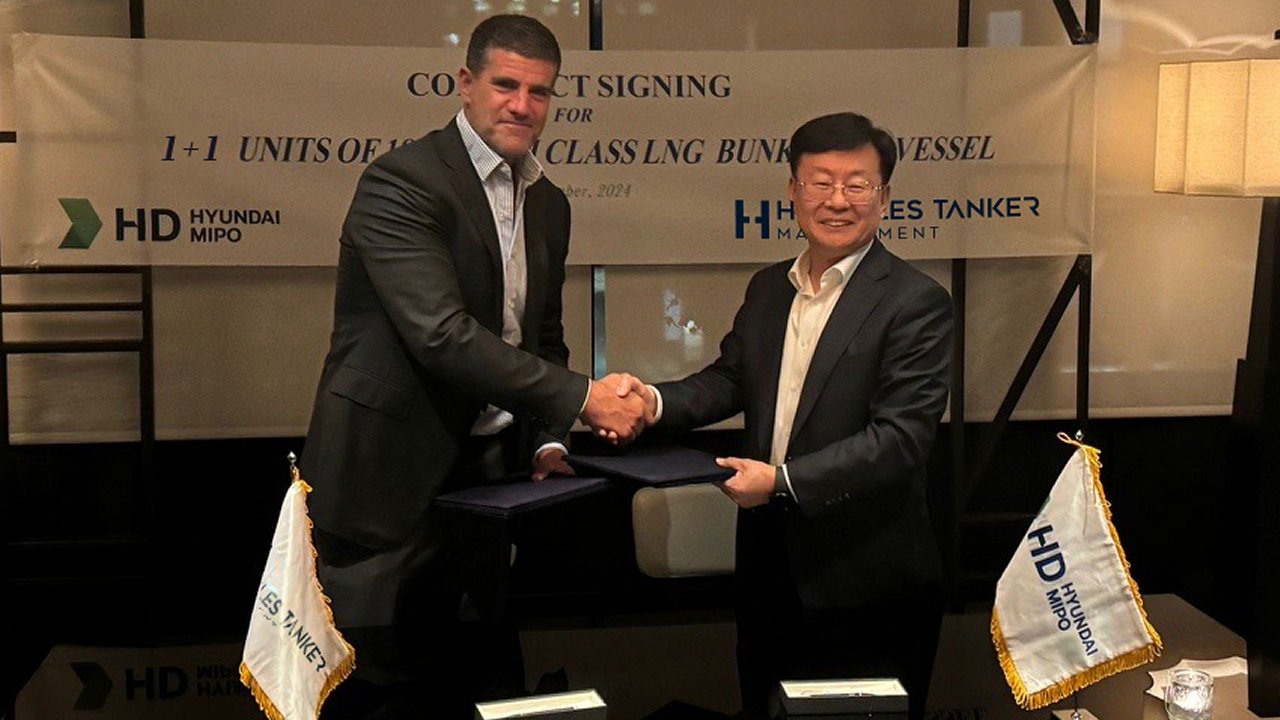
 |
The CEO and founder of bunker supplier Peninsula, John Bassadone, has signed an agreement with Hyundai Mipo Dockyard through his private shipping company, Hercules Tanker Management, to construct an 18,000-cbm dedicated LNG and bio-LNG bunkering vessel.
The new ship is due to be delivered in 2027 and deployed via Peninsula; and the agreement includes an option for the construction of a second vessel.
Peninsula has been operating the 12,500-cbm LNG bunkering vessel 'Levante LNG' since October 2023. The firm already supplies LNG as marine fuel to multiple customers across the Strait of Gibraltar and Western Mediterranean, including Royal Caribbean, Eastern Pacific, K-Line and MSC.
Commenting on the newbuild, Bassadone said: "The close working partnership between our own technical experts and Hyundai Mipo, one of the leaders in LNG bunkering vessel construction, will deliver a best-in-class ship, with no expense spared, to deliver optimal solutions for global shipping."
As regards the use of natural gas, Bassadone remarked: "LNG is one of the few lower-emission marine fuels available for commercially viable use today. Since the launch of Levante LNG, we have seen a significant increase in the LNG-capable global fleet, with many more vessels scheduled for launch in the coming years. We are investing today to maintain decarbonisation momentum tomorrow."
Nacho de Miguel, Head of Alternative Fuels & Sustainability at Peninsula, added: "Our LNG business has been carefully built over the past four years and this new vessel will enable us to further expand our global LNG supply footprint. Our experience and knowledge on LNG as a viable, lower-carbon fuel puts Peninsula in a strong position to meet future customer demand, and I look forward to welcoming the new vessel to the fleet in due course."

|
Lloyd’s Register grants approval for hybrid nuclear power design for amphibious vessels
Classification society approves Seatransport’s concept integrating micro modular reactors with diesel-electric systems. |
|
|
|
||

|
Everllence and Vale partner on ethanol-powered marine engine development
Brazilian mining company to develop dual-fuel ethanol engines based on ME-LGI platform. |
|
|
|
||

|
Emvolon highlights biomethanol as a solution to unlock India’s biogas potential
Company says distributed biogas-to-biomethanol production could bridge rural feedstock with maritime fuel demand. |
|
|
|
||

|
Grimaldi's Grande Svezia makes inaugural Le Havre call with ammonia-ready design
Second of 10 new-generation PCTCs features 5 MWh battery system and cold ironing capability. |
|
|
|
||

|
Kongsberg Maritime to supply integrated systems for LS Marine Solution cable lay vessel
Norwegian technology provider wins contract for ultra-large vessel being built at Tersan Shipyard in Türkiye. |
|
|
|
||

|
Synergy Marine takes on management of methanol dual-fuel container vessel
The 5,915-teu Maersk Finisterre joins Synergy's fleet under technical management from Synergy Pacific. |
|
|
|
||

|
Verde Marine Energy appoints Steve Taylor as UK director
Taylor will be based on the River Humber, working with Vertom Group businesses. |
|
|
|
||

|
Mitsubishi Shipbuilding delivers first ammonia fuel supply systems for marine engines
Systems shipped to Japan Engine Corporation for integration with an ammonia-fuelled marine engine. |
|
|
|
||

|
Power2X acquires HyCC to expand green hydrogen portfolio in the Netherlands and Germany
Deal consolidates clean molecules sector as projects transition from development to large-scale delivery phase. |
|
|
|
||

|
RFOcean signs binding e-methanol supply deal with ETFuels from 2030
European shipping company secures fixed-price green fuel ahead of escalating EU maritime emissions penalties. |
|
|
|
||
| Peninsula confirms maiden B30 deal in Zeebrugge [News & Insights] |
| Peninsula launches B100 bunker vessel in Barcelona [News & Insights] |